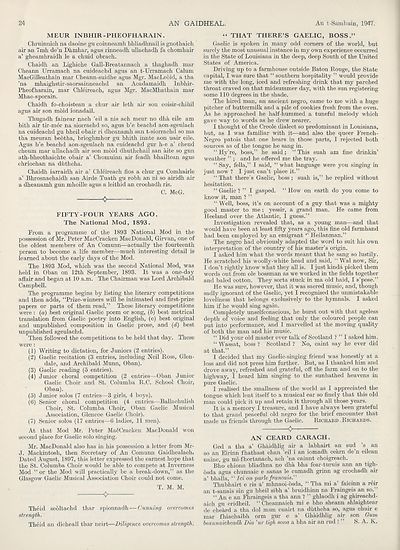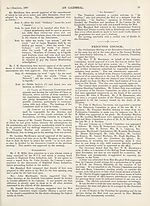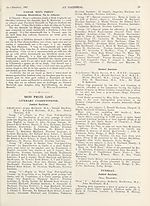Download files
Complete book:
Individual page:
Thumbnail gallery: Grid view | List view

AN GAIDHEAL.
An t-Samhuin, 1947.
MEUR INBHIR -PHEOFHARAIN.
Chruinnich na daoine gu coinneamh bhliadhnail is gnothaich
air an 7mh de’n Damhar, agus rinneadh ullachadh fa chomhair
a’ gheamhraidh le a chuid obrach.
Chaidh an Lighiche Gall-Breatannach a thaghadb mar
Cheann Urramach na cuideachd agus an t-Urramach Calum
MacGilleathain mar Cheann-suidhe agus Mgr. MacLeoid, a tha
’na mhaighstir-saorsainneachd an Acadamaidh Inbhir-
Pheofharain, mar Chleireach, agus Mgr. MacMhathain mar
Mhac-sporain.
Chaidh fo-choistean a chur air leth air son eoisir-chiuil
agus air son moid ionadail.
Thugadh fainear nach ’eil a nis ach meur no dha eile am
bith air tir-mor na siorraehd so, agus b’e beachd aon-sgeulach
na cuideachd gu bheil obair ri dheanamh san t-siorrachd so ma
tha meuran beotha, brioghmhor gu bhith innte aon uair eile.
Agus b’e beachd aon-sgeulach na cuideachd gur h-e a’ cheud
cheum mar ullachadh air son moid dhuthchail san aite so gun
ath-bheothaichte obair a’ Chomuinn air feadh bhailtean agus
chriochan na duthcha.
Chaidh iarraidh air a’ Chleireach fios a chur gu Comhairle
a’ Bhrosnachaidh san Airde Tuath gu robh an ni so airidh air
a dheanamh gun mhoille agus a leithid an crochadh ris.
FIFTY-FOUR YEARS AGO.
The National Mod, 1893.
From a programme of the 1893 National Mod in the
possession of Mr. Peter MacCracken MacDonald, Girvan, one of
the oldest members of An Comunn—actually the fourteenth
person to become a life member-—much interesting detail is
learned about the early days of the Mod.
The 1893 Mod, which was the second National Mod, was
held in Oban on 12th September, 1893. It was a one-day
affair and began at 10 a.m. The Chairman was Lord Archibald
Campbell.
The programme begins by listing the literary competitions
and then adds, “Prize-winners will be intimated and first-prize
papers or parts of them read,” These literary competitions
were : (a) best original Gaelic poem or song, (6) best metrical
translation from Gaelic poetry into English, (c) best original
and unpublished composition in Gaelic prose, and (d) best
unpublished sgeulachd.
Then followed the competitions to be held that day. These
were :
(1) Writing to dictation, for Juniors (2 entries).
(2) Gaelic recitation (3 entries, including Neil Ross, Glen¬
dale, and Archibald Munn, Oban).
(3) Gaelic reading (5 entries).
(4) Junior choral competition (2 entries—Oban Junior
Gaelic Choir and St. Columba R.C. School Choir,
Oban).
(5) Junior solos (7 entries—3 girls, 4 boys).
(6) Senior choral competition (4 entries—Ballachulish
Choir, St. Columba Choir, Oban Gaelic Musical
Association, Glencoe Gaelic Choir).
(7) Senior solos (17 entries—-6 ladies, 11 men).
At that Mod Mr. Peter MafiCracken MacDonald won
second place for Gaelic solo singing.
Mr. MacDonald also has in his possession a letter from Mr-
J. Mackintosh, then Secretary of An Comunn Gaidhealach,
Dated August, 1897, this letter expressed the earnest hope that
the St. Columba Choir would be able to compete at Inverness
Mod “ or the Mod will practically be a break-down,” as the
Glasgow Gaelic Musical Association Choir could not come.
T. M. M.
0
Theid seoltachd thar spionnadh — Cunning overcomes
strength.
Theid an dicheall thar neirt—Diligence overcomes strength.
“ THAT THERE’S GAELIC, BOSS.”
Gaelic is spoken in many odd corners of the world, but
surely the most unusual instance in my own experience occurred
in the State of Louisiana in the deep, deep South of the United
States of America.
Driving up to a farmhouse outside Baton Rouge, the State
capital, I was sure that “ southern hospitality ” would provide
me with the long, iced and refreshing drink that my parched
throat craved on that midsummer day, with the sun registering
some 110 degrees in the shade.
The hired man, an ancient negro, came to me with a huge
pitcher of buttermilk and a pile of cookies fresh from the oven.
As he approached he half-hummed a tuneful melody which
gave way to words as he drew nearer.
I thought of the Creole dialect so predominant in Louisiana,
but, as I was familiar with it—and also the queer French-
Negro patois that one hears in those parts, I rejected both
sources as of the tongue he sang in.
“ Hy’re, boss,” he said; “ This suah am fine drinkin’
weather ” ; and he offered me the tray.
“ Say, fella,” I said, “ what language were you singing in
just now ? I just can’t place it.”
“ That there’s Gaelic, boss ; suah is,” he replied without
hesitation.
“Gaelic ? ” I gasped. “How on earth do you come to
know it, man ? ”
“ Well, boss, it’s on account of a guy that was a mighty
good master to me ; yessir, a grand man. He came from
Heeland over the Atlantic, I guess.”
Investigation revealed that, as a young man—and that
would have been at least fifty years ago, this fine old farmhand
had been employed by an emigrant ‘‘ Heilanman.”
The negro had obviously adapted the word to suit his own
interpretation of the country of his master’s origin.
I asked him what the words meant that he sang so lustily.
He scratched his woolly-white head and said, “ Wal now, Sir,
I don’t rightly know what they all is. I just kinda picked them
words out from ole bossman as we worked in the fields together
and baled cotton. They sorta stuck in ma old haid, I s’pose.”
He was sure, however, that it was sacred music, and, though
sadly ignorant of the Gaelic, yet I recognised the unmistakable
loveliness that belongs exclusively to the hymnals. I asked
him if he would sing again.
Completely unselfconscious, he burst out with that ageless
depth of voice and feeling that only the coloured people can
put into performance, and I marvelled at the moving quality
of both the man and his music.
“ Did your old master ever talk of Scotland ? ” I asked him.
“ Wassat, boss ? Scotland ? No, caint say he ever did
at that.”
I decided that my Gaelic-singing friend was honestly at a
loss and did not press him further. But, as I thanked him and
drove away, refreshed and grateful, off the farm and on to the
highway, I heard him singing to the sunbathed heavens in
pure Gaelic.
I realised the smallness of the world as I appreciated the
tongue which lent itself to a musical ear so finely that this old
man could pick it up and retain it through all those years.
It is a memory I treasure, and I have always been grateful
to that grand peaceful old negro for the brief encounter that
made us friends through the Gaelic. Richard Richards.
AN CEARD CARACH.
Ged a tha a’ Ghaidhlig air a labhairt an sud ’s an
so an Eirinn fhathast chan ’eil i an iomadh cearn de’n eilean
uaine, gu mi-fhortanach, ach ’na cainnt choigreach.
Bho chionn bliadhna no dha bha fear-turuis ann an tigh-
6sda agus chunnaic e sanas le cumadh grinn ag crochadh air
a’ bhalla, “ Id on parle francais. ’ ’
Thubhairt e ris a’ mhnaoi-osda, “ Tha mi a’ faicinn a reir
an t-sanais sin gu bheil sibh a’ bruidhinn na Fraingeis an so.”
“ An e an Fhraingeis a tha ann ? ” ghlaodh i ag gaireachd-
aich gu cridheil. “ Cheannaich mi e bho sheann shlaightear
de cheard a tha dol mun cuairt na dhthcha so, agus chuir e
mar fhiachaibh orm gur e a’ Ghaidhlig air son Gum
beannaicheadh Dia ’ur tigh sona a bha air an rud ! ” S. A. K.
An t-Samhuin, 1947.
MEUR INBHIR -PHEOFHARAIN.
Chruinnich na daoine gu coinneamh bhliadhnail is gnothaich
air an 7mh de’n Damhar, agus rinneadh ullachadh fa chomhair
a’ gheamhraidh le a chuid obrach.
Chaidh an Lighiche Gall-Breatannach a thaghadb mar
Cheann Urramach na cuideachd agus an t-Urramach Calum
MacGilleathain mar Cheann-suidhe agus Mgr. MacLeoid, a tha
’na mhaighstir-saorsainneachd an Acadamaidh Inbhir-
Pheofharain, mar Chleireach, agus Mgr. MacMhathain mar
Mhac-sporain.
Chaidh fo-choistean a chur air leth air son eoisir-chiuil
agus air son moid ionadail.
Thugadh fainear nach ’eil a nis ach meur no dha eile am
bith air tir-mor na siorraehd so, agus b’e beachd aon-sgeulach
na cuideachd gu bheil obair ri dheanamh san t-siorrachd so ma
tha meuran beotha, brioghmhor gu bhith innte aon uair eile.
Agus b’e beachd aon-sgeulach na cuideachd gur h-e a’ cheud
cheum mar ullachadh air son moid dhuthchail san aite so gun
ath-bheothaichte obair a’ Chomuinn air feadh bhailtean agus
chriochan na duthcha.
Chaidh iarraidh air a’ Chleireach fios a chur gu Comhairle
a’ Bhrosnachaidh san Airde Tuath gu robh an ni so airidh air
a dheanamh gun mhoille agus a leithid an crochadh ris.
FIFTY-FOUR YEARS AGO.
The National Mod, 1893.
From a programme of the 1893 National Mod in the
possession of Mr. Peter MacCracken MacDonald, Girvan, one of
the oldest members of An Comunn—actually the fourteenth
person to become a life member-—much interesting detail is
learned about the early days of the Mod.
The 1893 Mod, which was the second National Mod, was
held in Oban on 12th September, 1893. It was a one-day
affair and began at 10 a.m. The Chairman was Lord Archibald
Campbell.
The programme begins by listing the literary competitions
and then adds, “Prize-winners will be intimated and first-prize
papers or parts of them read,” These literary competitions
were : (a) best original Gaelic poem or song, (6) best metrical
translation from Gaelic poetry into English, (c) best original
and unpublished composition in Gaelic prose, and (d) best
unpublished sgeulachd.
Then followed the competitions to be held that day. These
were :
(1) Writing to dictation, for Juniors (2 entries).
(2) Gaelic recitation (3 entries, including Neil Ross, Glen¬
dale, and Archibald Munn, Oban).
(3) Gaelic reading (5 entries).
(4) Junior choral competition (2 entries—Oban Junior
Gaelic Choir and St. Columba R.C. School Choir,
Oban).
(5) Junior solos (7 entries—3 girls, 4 boys).
(6) Senior choral competition (4 entries—Ballachulish
Choir, St. Columba Choir, Oban Gaelic Musical
Association, Glencoe Gaelic Choir).
(7) Senior solos (17 entries—-6 ladies, 11 men).
At that Mod Mr. Peter MafiCracken MacDonald won
second place for Gaelic solo singing.
Mr. MacDonald also has in his possession a letter from Mr-
J. Mackintosh, then Secretary of An Comunn Gaidhealach,
Dated August, 1897, this letter expressed the earnest hope that
the St. Columba Choir would be able to compete at Inverness
Mod “ or the Mod will practically be a break-down,” as the
Glasgow Gaelic Musical Association Choir could not come.
T. M. M.
0
Theid seoltachd thar spionnadh — Cunning overcomes
strength.
Theid an dicheall thar neirt—Diligence overcomes strength.
“ THAT THERE’S GAELIC, BOSS.”
Gaelic is spoken in many odd corners of the world, but
surely the most unusual instance in my own experience occurred
in the State of Louisiana in the deep, deep South of the United
States of America.
Driving up to a farmhouse outside Baton Rouge, the State
capital, I was sure that “ southern hospitality ” would provide
me with the long, iced and refreshing drink that my parched
throat craved on that midsummer day, with the sun registering
some 110 degrees in the shade.
The hired man, an ancient negro, came to me with a huge
pitcher of buttermilk and a pile of cookies fresh from the oven.
As he approached he half-hummed a tuneful melody which
gave way to words as he drew nearer.
I thought of the Creole dialect so predominant in Louisiana,
but, as I was familiar with it—and also the queer French-
Negro patois that one hears in those parts, I rejected both
sources as of the tongue he sang in.
“ Hy’re, boss,” he said; “ This suah am fine drinkin’
weather ” ; and he offered me the tray.
“ Say, fella,” I said, “ what language were you singing in
just now ? I just can’t place it.”
“ That there’s Gaelic, boss ; suah is,” he replied without
hesitation.
“Gaelic ? ” I gasped. “How on earth do you come to
know it, man ? ”
“ Well, boss, it’s on account of a guy that was a mighty
good master to me ; yessir, a grand man. He came from
Heeland over the Atlantic, I guess.”
Investigation revealed that, as a young man—and that
would have been at least fifty years ago, this fine old farmhand
had been employed by an emigrant ‘‘ Heilanman.”
The negro had obviously adapted the word to suit his own
interpretation of the country of his master’s origin.
I asked him what the words meant that he sang so lustily.
He scratched his woolly-white head and said, “ Wal now, Sir,
I don’t rightly know what they all is. I just kinda picked them
words out from ole bossman as we worked in the fields together
and baled cotton. They sorta stuck in ma old haid, I s’pose.”
He was sure, however, that it was sacred music, and, though
sadly ignorant of the Gaelic, yet I recognised the unmistakable
loveliness that belongs exclusively to the hymnals. I asked
him if he would sing again.
Completely unselfconscious, he burst out with that ageless
depth of voice and feeling that only the coloured people can
put into performance, and I marvelled at the moving quality
of both the man and his music.
“ Did your old master ever talk of Scotland ? ” I asked him.
“ Wassat, boss ? Scotland ? No, caint say he ever did
at that.”
I decided that my Gaelic-singing friend was honestly at a
loss and did not press him further. But, as I thanked him and
drove away, refreshed and grateful, off the farm and on to the
highway, I heard him singing to the sunbathed heavens in
pure Gaelic.
I realised the smallness of the world as I appreciated the
tongue which lent itself to a musical ear so finely that this old
man could pick it up and retain it through all those years.
It is a memory I treasure, and I have always been grateful
to that grand peaceful old negro for the brief encounter that
made us friends through the Gaelic. Richard Richards.
AN CEARD CARACH.
Ged a tha a’ Ghaidhlig air a labhairt an sud ’s an
so an Eirinn fhathast chan ’eil i an iomadh cearn de’n eilean
uaine, gu mi-fhortanach, ach ’na cainnt choigreach.
Bho chionn bliadhna no dha bha fear-turuis ann an tigh-
6sda agus chunnaic e sanas le cumadh grinn ag crochadh air
a’ bhalla, “ Id on parle francais. ’ ’
Thubhairt e ris a’ mhnaoi-osda, “ Tha mi a’ faicinn a reir
an t-sanais sin gu bheil sibh a’ bruidhinn na Fraingeis an so.”
“ An e an Fhraingeis a tha ann ? ” ghlaodh i ag gaireachd-
aich gu cridheil. “ Cheannaich mi e bho sheann shlaightear
de cheard a tha dol mun cuairt na dhthcha so, agus chuir e
mar fhiachaibh orm gur e a’ Ghaidhlig air son Gum
beannaicheadh Dia ’ur tigh sona a bha air an rud ! ” S. A. K.
Set display mode to:
![]() Universal Viewer |
Universal Viewer | ![]() Mirador |
Large image | Transcription
Mirador |
Large image | Transcription
| An Comunn Gàidhealach > An Comunn Gàidhealach Publications > Gaidheal > Volume 43, October 1947--December 1948 > (32) Page 24 |
|---|
| Permanent URL | https://digital.nls.uk/125251656 |
|---|
| Description | This contains items published by An Comunn, which are not specifically Mòd-related. It includes journals, annual reports and corporate documents, policy statements, educational resources and published plays and literature. It is arranged alphabetically by title. |
|---|
| Description | A collection of over 400 items published by An Comunn Gàidhealach, the organisation which promotes Gaelic language and culture and organises the Royal National Mòd. Dating from 1891 up to the present day, the collection includes journals and newspapers, annual reports, educational materials, national Mòd programmes, published Mòd literature and music. |
|---|---|
| Additional NLS resources: |
|

